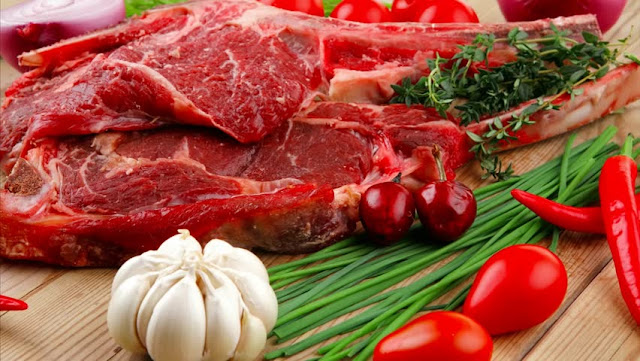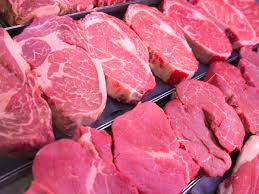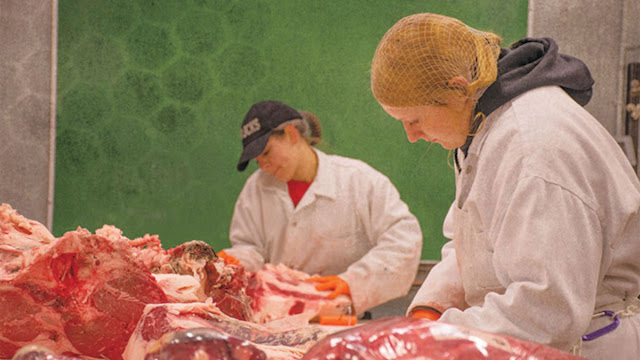- Get link
- X
- Other Apps
Posted by
Nazish
on
- Get link
- X
- Other Apps
Why is meat healthy?
What is meat?
Meat is an
animal flesh which humans cook to eat like food. In the US and many other
countries worldwide, it mainly refers to mammals
and birds' muscle tissue.
It is a long
debate and highly controversial that whether one should prefer meat or
vegetables. On the one hand,
meat is included in many diets as a protein source and important nutrients.
On the other
hand, some people believe eating it is unhealthy, unethical, and unnecessary.
Vegetable
eaters are simply called vegetarians, while meat-eaters are called meatatarian.
Non-meat eaters experience
vitamin deficiencies and suffer decreased brain volume and fatigue.
This blog
will help us a detailed look at the health benefits of consuming meat.
Different types of meat
1.Red meat
This comes
from mammals and contains more myoglobin in its tissue than white meat.
Examples
include:
beef
(cattle)
pork (pigs
and hogs)
lamb
veal
(calves)
goat
bison, elk,
and venison (deer)
>. Beef Nutrients
A 3.5-ounce
(100-gram) serving of cooked chicken breast contains about 31 grams of protein.
The same serving of lean beef contains about 27 grams.
A 100-gram portion of lean beef provides,
Calories:
205
Protein:
About 27 grams
Riboflavin:
15% of the Daily Value (DV)
Niacin: 24%
of the DV
Vitamin B6:
19% of the DV
Vitamin B12:
158% of the DV
Niacin: 24%
of the DV
Phosphorus:
19% of the DV
Zinc: 68% of
the DV
Selenium:
36% of the DV
2.White meat
This is type
is lighter in color than red meat and comes from birds.
>. The main source of meat today?
Today, most
meat worldwide comes from domesticated animals raised on farms, mainly on
industrial-scale that often houses thousands of animals at a time.
>. Health Benefits
In the last
10,000 years we’ve gotten smaller in stature and brain size. With a heavy
grain- and sugar-based diet, we are suffering increased rates of obesity,
cancer, diabetes, and osteoporosis. We’re also experiencing an alarming incidence
of skin problems, heart disease, and inflammation.
Human teeth
are naturally designed to eat meat, Incisors for tearing meat, and molars for
grinding it. If we compare ourselves with cows (cows eat plants only), they
have 4 stomachs, and humans have one. This also supports the meat-eating nature of
humans.
Following
are the health benefits of consuming meat.
1.Protein
We take
protein-rich supplements, but naturally, the best source of protein is meat. Meat
also contains vitamins and minerals that help in muscle growth, like zinc, which
assists in muscle repair and iron, which boosts energy levels and overcomes
fatigue.
2. Iron
Meat, fish
and poultry contains iron, which helps to prevent anemia because the body
absorbs this iron better than non- iron found in plant foods such as
vegetables.
3. Muscle
Body posture
of meat-eaters is stronger than that of vegetarians. It provides muscle
strength.
4. Bone
Diets
without meat usually contain lower amounts of calcium, vitamin D, vitamin B-12,
protein, and omega-3 fatty acids, which have important roles in maintaining
bone health.
5. Brain
Meat
contains vitamin B12, which promotes brain development in children.
6. Heart
Meat
products are good to boost energy level and maintains a healthy heart
7. Blood Sugar Control.
Researches
shows meat helps maintain sugar levels in the body. This is great news for
diabetics.
9. Immunity.
Zinc present
in meat is a continuous source of immunity.
10. Cancer prevention
A serving of
beef or lamb delivers half a human’s daily selenium needs. Selenium is an
antioxidant that prevents cell damage and may contribute to cancer prevention.
11. Energy
It gives instant energy to the head and
heart.
12. Weight Loss
Studies now
shows that boiled, smoked, and oven-baked meat helps in weight loss. GYM
instructors also advise including meat in their daily routine. It provides long-lasting energy, resulting in fewer hunger pangs.
The Myths About Meat
A most harmful
myth about meat is that it doesn’t belong in a healthy diet
As told earlier, some people strongly believe that meat consumption leads to high cholesterol, high blood pressure, heart disease, and obesity.
But the main source
of all these diseases is sugar. Sugar
contains carbohydrates resulting in bad health, obesity, and fatigue.
The
degenerative health conditions that exist now weren’t around when the
cavemen’s main source of food was meat, vegetables, fish, nuts, seeds, and
fruits. 45-65% of energy requirements were derived from
animal sources, and diseases were unknown to them in earlier societies.
Harvard University Research
According to
Harvard University evolutionary biologists Katherine
Zink and Daniel Lieberman ( the authors of the Nature paper) researched that
vegetarians had to go through up to 15 million “chewing cycles” a year.
Meat is much
more calorie-rich meal. It does not require more chewing cycles as compared to
plant-eaters. (Cooking has made things easier but did not come into vogue
until 500,000 years ago.)
Another Research
Zink and Lieberman experimented with 24 modern humans and give them 3 kinds of food to consume (jewel yams, carrots, and beets) and one kind of meat (goat, raw).
With electromyography
sensors, they measured the amount of energy the head and jaw muscles exert to chew and swallow the sample food items.
Results of this research was not shocking, as they found 39% to 46% less force is required to chew and swallow processed meat than processed plant foods.
Interesting Meat Facts
- Some companies package beef in a carbon monoxide atmosphere to keep the meat looking pink or “fresh” for up to one full year. This only affects the color, though; the meat still spoils normally.
- English words for livestock (cow, sheep, chicken) are Germanic-based, and the words for meats (beef, mutton, poultry) are French-based. This is because the people who raised the animals were Anglo-Saxon peasants and the people who ate them were Norman aristocrats.
- The red juice seeping out of a perfectly cooked rare steak is not blood but a mix of water and myoglobin.
- Americans mostly eat white chicken meat and export the rest to Russia/Asia, where dark meat is preferred, so most chickens get split in two and sent worldwide.
- Usain Bolt ate 100 Chicken McNuggets a day for 10 days before the Beijing Olympics and eventually won 3 gold medals.
- 49% of American adults eat at least one sandwich on any given day, according to the CDC. The most common fillings are lettuce, mayonnaise, tomatoes, mustard, catsup, and ham.
- Canned food can last indefinitely if sealed properly. On his wedding day in 1956, Beryl Lailey promised to keep a canned whole chicken until his 50th Anniversary, when he would eat it. He did and did not become ill.
- Japan is obsessed with Kentucky Fried. Chicken on Christmas. Some people even order months in advance to avoid lines.
- Scientists are developing edible meat grown from stem cells, hoping to replace meat from slaughtered livestock.
- 70% of all red meat consumed worldwide is goat meat.
- The terms “white meat” and “dark meat” comes from the Victorian era, when people were too embarrassed to use the words “leg” and “breast.”
- Before 1868, eating meat from four-legged animals had been prohibited in Japan for more than a thousand years.
- Denmark has the highest consumption of meat per person. (Source)
In a
nutshell, meat is an excellent source of nutrition. It helps build
our immune system, and meat intake helps fight against many diseases, such as type 2 sugar and cancer. In this blog, we discussed meat, its
types, health benefits, researches, and in the last some interesting facts about
meat.
I hope you would help me to write more and more. As a new blogger, I have just started writing, and I am inspired by Google, YouTube and other information channels.
If you think some information is missing or not accurate, then please share your valuable comments. Help us grow. Thanks for Reading this whole long blog.😊 I will try to cover maximum meat recipes in my upcoming blogs.
Comments






Amazing content. Informative.
ReplyDeleteThanks for sharing such detailed article.
Thanks for your valueable feedback :)
DeleteThe information you've provided is useful because it provides a wealth of knowledge about best restaurants near windermere that will be highly beneficial to me. Thank you for sharing that. Keep up the good work.
ReplyDelete